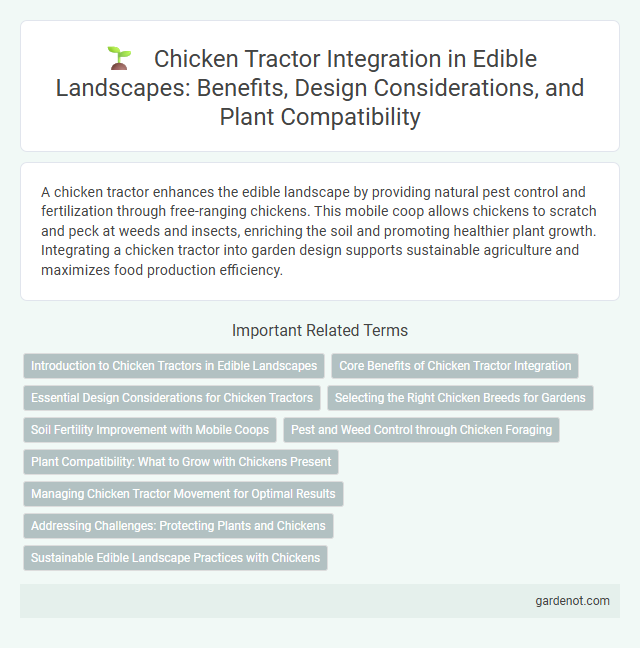A chicken tractor enhances the edible landscape by providing natural pest control and fertilization through free-ranging chickens. This mobile coop allows chickens to scratch and peck at weeds and insects, enriching the soil and promoting healthier plant growth. Integrating a chicken tractor into garden design supports sustainable agriculture and maximizes food production efficiency.
Introduction to Chicken Tractors in Edible Landscapes
Chicken tractors are mobile coops designed to allow chickens to graze on fresh soil while providing shelter and protection. In edible landscapes, they enhance soil fertility and pest control by naturally fertilizing and aerating the ground. These movable structures support sustainable gardening by integrating poultry management with plant cultivation.
Core Benefits of Chicken Tractor Integration
Integrating a chicken tractor into an edible landscape boosts soil fertility by naturally depositing nutrient-rich manure, which enhances plant growth and reduces the need for synthetic fertilizers. Chicken tractors enable efficient pest control as chickens forage on insects and larvae, minimizing crop damage and promoting healthier produce. This sustainable practice supports rotational grazing, improving soil structure and increasing biodiversity within the garden ecosystem.
Essential Design Considerations for Chicken Tractors
Essential design considerations for chicken tractors include ensuring adequate ventilation to maintain air quality and prevent overheating, while incorporating predator-proof materials such as hardware cloth to protect chickens from foxes and raccoons. The size of the tractor must be sufficient to allow natural foraging behavior, generally providing around 2 to 3 square feet per bird, and the structure should be lightweight and mobile for easy relocation to fresh grazing areas. Durable, weather-resistant roofing and secure nesting areas enhance chicken comfort and egg production, making these elements critical in optimizing the functionality of edible landscape chicken tractors.
Selecting the Right Chicken Breeds for Gardens
Selecting the right chicken breeds for gardens involves choosing hardy, low-maintenance birds that effectively control pests and enrich soil without damaging plants. Breeds like Barred Rock, Rhode Island Red, and Sussex are ideal for edible landscapes due to their foraging ability, temperament, and adaptability to chicken tractor systems. Their foraging behavior promotes natural fertilization and weed control, making them valuable assets in sustainable garden management.
Soil Fertility Improvement with Mobile Coops
Chicken tractors enhance soil fertility by allowing chickens to naturally till and fertilize the ground as they forage. The mobile coops distribute nutrient-rich manure evenly, promoting healthier soil microbiomes and increased organic matter content. This sustainable method reduces the need for chemical fertilizers while boosting plant growth in edible landscapes.
Pest and Weed Control through Chicken Foraging
Chicken tractors enhance pest and weed control by allowing chickens to forage directly on targeted garden areas, reducing insect populations and uprooting weed seedlings naturally. The chickens' scratching behavior disturbs soil surfaces, limiting weed establishment while simultaneously providing organic fertilization. This sustainable method minimizes the need for chemical pesticides and herbicides, promoting a healthier edible landscape ecosystem.
Plant Compatibility: What to Grow with Chickens Present
Chicken tractors create a dynamic synergy with companion plants such as comfrey, clover, and nitrogen-fixing legumes that enhance soil fertility and provide chickens with additional nutrition. Herbs like basil, thyme, and rosemary thrive alongside chickens by deterring pests while tolerating light scratching and pecking. Incorporating hardy vegetables such as kale, Swiss chard, and collard greens within or near chicken tractors ensures mutual benefits, combining natural pest control and nutrient-rich mulch from chicken droppings.
Managing Chicken Tractor Movement for Optimal Results
Managing chicken tractor movement effectively enhances soil fertility and pest control in edible landscapes by allowing chickens to forage on fresh ground regularly. Rotating the chicken tractor every 1 to 3 days prevents overgrazing and soil compaction, promoting uniform nutrient distribution and encouraging healthy plant growth. Monitoring moisture levels and vegetation cover ensures optimal timing for relocation, maximizing the benefits of chicken manure as a natural fertilizer.
Addressing Challenges: Protecting Plants and Chickens
Chicken tractors provide a sustainable solution for edible landscapes by minimizing damage to plants while allowing chickens to forage freely. Strategically designed enclosures with movable panels and secure fencing protect crops from pecking and trampling, ensuring plant health. Reinforced coop structures combined with shaded areas prevent chicken stress and predators, promoting a balanced ecosystem.
Sustainable Edible Landscape Practices with Chickens
Chicken tractors enhance sustainable edible landscape practices by enabling rotational grazing that naturally fertilizes soil and controls pests without chemical inputs. These movable coops allow chickens to forage on fresh vegetation, providing nutrients to the soil while reducing weed growth and insect populations. Integrating chicken tractors into edible gardens promotes a healthy ecosystem and improves plant yields through organic nutrient cycling.
Chicken tractor Infographic

 gardenot.com
gardenot.com